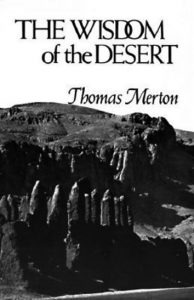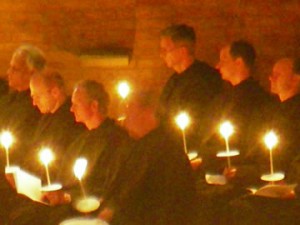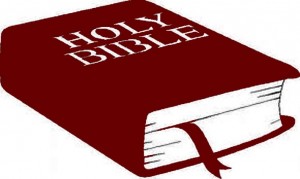The Monk and the Bible
A Story from a 4th Century Desert Father
Here is a story taken from a Thomas Merton book titled The Wisdom of the Desert and it comes to us from the fourth century desert father, Abbot Anastasius.
There once was a wise monk, Abbot Anastasius, living alone in the desert, who had a very nice bible made of parchment that was worth, say about $100. The Abbot was hospitable and when another brother arrived, he made him welcome. It was after this visit when the Abbot went to read his bible that he discovered the bible was gone and he realised the brother had taken it. He feared if he ran after the brother and asked about the bible, the brother might add “perjury to theft” so the Abbot stayed put.
Not long after this a trader from the nearby city came to the Abbot. He had the very bible that had gone missing. He wanted Abbot Anastasius to tell him how much it was worth because a monk was offering to sell it to him for $80. “Yes,” said Abbot Anastasius, “It is a fine bible and it is worth that much.”
Satisfied, the trader returned to the monk and agreed to buy it. “Abbot Anastasius told me it was a fine bible and worth the amount you asked for.”
“Did he say anything else?” asked the monk.
“No,” replied the trader, “not a thing.”
“I’ve changed my mind,” said the monk. “The bible is no longer for sale.”
Instead the monk returned to the Abbot and offered the bible back.
“Please take it back,” said the monk.
“It is your bible.”
“You can have it,” replied the Abbot. “It is a gift. Go in peace.”
“No,” replied the monk with tears in his eyes. “I can have no peace until you take back your bible.”
After that the monk stayed with the Abbot for the rest of his days.
Now this story intrigued me because when someone robbed me of my hand bag I did the very opposite to Abbot Anastasius. I ran in the direction of the thief, yelled at them to return my bag and then I called the police. I acted instinctively. I took a moment to reflect and tried to imagine what the wise Abbot was thinking when he decided not to chase after the thief.
When Abbot Anastasius realised his brother had run off with the bible he was both sad the bible was gone and angry the bible had been wrongly taken. However, far exceeding these feelings, the Abbot was worried about his brother. Abbot wondered if he had encouraged the brother to take the bible. If he had, it was accidental. As the Abbot wondered what to do, he decided he didn’t want to make things get any worse. If he ran after the brother to get the bible back and the brother denied having the bible, then on top of stealing the bible, the brother would also have lied. Or even worse, the brother might reveal the bible then swear on the very bible he had stolen that it was his. The Abbot very much didn’t want his brother to do that. Neither did the Abbot want to be part of such a thing. The Abbot decided the best thing to do was to stay put and leave the rest in God’s hands.
What is most important to the Abbot is to follow in Christ’s footsteps, to leave behind the slavery of sin and embrace the freedom of Christian living. Abbot Anastasius is very serious about this and he takes the utmost care in all his actions. On the surface it seems that the Abbot is weak in not chasing after the offender, but when you dig a little further, you see the iron will of a man following a course of action that goes against the natural indignation he would have felt from the crime. The Abbot puts aside his feelings and concentrates fully on the other with a care that leaves us perplexed. 
I was further intrigued further on in the story when the Abbot refuses to take back the bible when the trader turns up with it. That’s what I would have done. God loves us with an infinite love. We are priceless in God’s eyes. The brother is priceless before God’s eyes and deserves to be treated with great dignity. The Abbot therefore refuses to condemn the brother in front of the trader. Further the Abbot accepts the coincidence of the trader’s visit as being part of God’s care in the situation and he cooperates by answering the trader’s question.
The most amusing part of the story follows. The trader innocently tells the brother that he asked the Abbot to value the bible. The brother cannot deny having the bible any longer. Further, something of himself has been revealed. The brother’s only interest in the bible is to sell it for money. There is now no doubt at all that the bible was stolen. Yet the brother is unable to go through with the sale. Why? In the light of the Abbot’s actions imitating Christ, in the light of God’s grace, the brother has felt the beginnings of remorse.
Abbot Anastasius has a lesson for us all. Sin hasn’t gone anywhere. In our sinful world, in caring for our neighbour, we must also care for ourselves – from over reacting, seeking revenge, condemnation. Much easier said than done! We are like students on a journey where love of neighbour and love of self grow and mature together. It takes Christian maturity to love as the Abbot loved his brother.
Maybe this story was written to benefit new recruits. The Abbot is challenging the younger monks, as they enter the desert life still attracted to things of the world, as symbolised by money, their lives will now move in a new direction. This challenges them to take up their cross in prayer, penance and self denial to allow love of self and love of neighbour to grow together. Further, that this life-long journey is not easy, and the benefit of a mentor, an older monk, is there to help them on their way.
There are hidden depths in this little story. And I have probably missed most of them! It is so concise, simple and without embellishments that it is easy to let the hidden depths pass right over your head. One final point, when the Abbot and the brother spend the rest of their days together, to me it says that it is in community and not in isolation that we find our redemption. The desert fathers may have seemed alone and isolated in their huts, but no, they still lived in community with each other.


 Entries(RSS)
Entries(RSS)